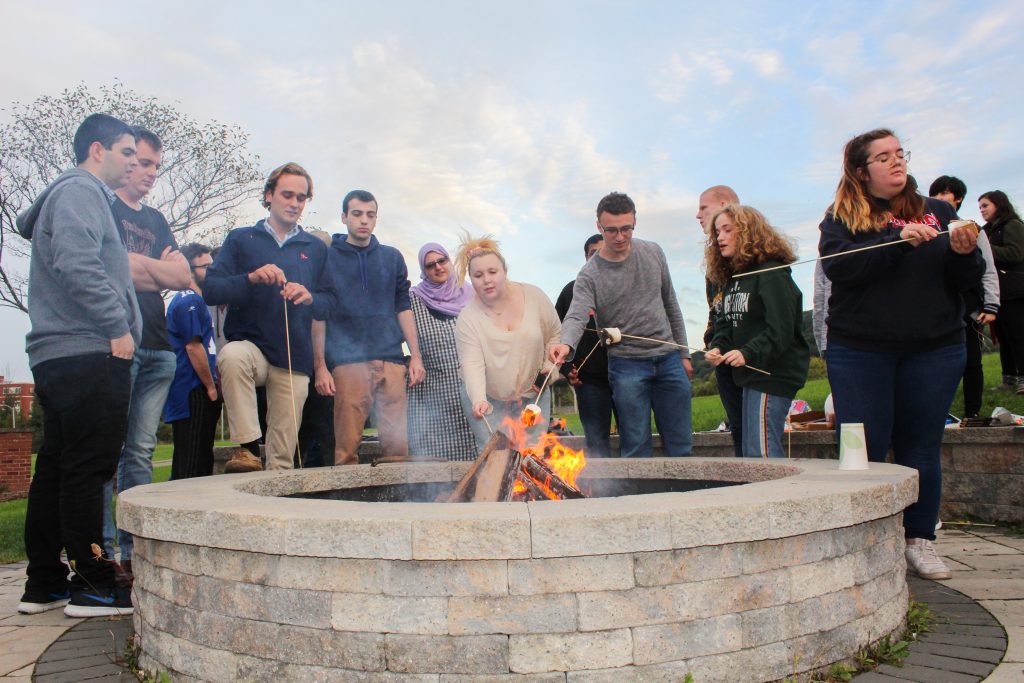
As election season heats up, political student organizations are holding events in an effort to promote civic engagement on campus. While some aim to ramp up support for specific candidates, others are bipartisan.
On Monday, Binghamton University students from across the political spectrum gathered around the fire pit in Susquehanna Community to roast s’mores and discuss politics.
The second annual “Bipartisan Bonfire” was hosted by College Democrats, College Republicans, College Libertarians, Peace Action and the Roosevelt Institute. The bonfires, along with other collaborative events, are meant to allow students to take part in roundtable debates. Some events focus on a single topic, some cover a broad range of issues and occasionally, the events aren’t political, just social. All are intended to broaden participants’ horizons.
Chris DeMarco, president of College Republicans and a senior majoring in political science, said the debates attract both students with strong opinions and those who wish to become more informed.
“A lot of times, students who are undecided come and leave with their perspective changed or with more thought about whatever the issue is,” DeMarco said.
Carlotta Kane, communications director for College Democrats and a senior majoring in graphic design, said the bonfire provided an opportunity for members of political organizations to become more acquainted with one another.
“This is a way to get to know each other in a way that isn’t centered so much around politics,” Kane said. “Everyone here is interested in being involved in politics on campus and passionate about change in whatever sphere.”
According to DeMarco, the goal of these events is for students to find commonalities with those who have different political opinions.
“I think it’s a good show of unity, especially in today’s climate,” DeMarco said. “Things are really crazy and people hate each other, but it’s kind of a reminder that we’re all people and we all do the same things, too. Like we’re all interns for congressional nominees, but I work for Claudia Tenney and they work for [Anthony] Brindisi, but it’s the same job so it kind of brings into perspective and we swap stories.”
Brian Garcia, president of College Democrats and a senior majoring in economics, said the first “Bipartisan Bonfire” took place shortly after the 2016 presidential election.
“Emotions were running raw but I think even then, people were respectful and there wasn’t any kind of name-calling or slurs, which was something I was concerned about and I was glad it didn’t happen,” Garcia said.
Ever since, the bonfire has served as a way to further develop the sense of camaraderie already present among the campus political organizations. Patrick McAuliffe, president of College Libertarians and a senior double-majoring in philosophy and political science, said the bonfire is designed to facilitate casual conversations among friends.
“All of these political clubs are pretty close-knit,” McAuliffe said. “We engage each other on current events, so I think this is just an opportunity for us to meet outside of meeting times and sort of talk in maybe a more casual setting.”
Tommy Gagliano, a sophomore majoring in political science and member of College Libertarians, said he attended the event for the first time. According to Gagliano, he was pleasantly surprised by the laid-back atmosphere.
“It seems really civil, no one is really yelling or attacking anyone,” Gagliano said. “We’re all just talking and having a good time.”
According to Mike Lieberman, president of Peace Action and a senior majoring in English, the event is an effective way to bring people on both sides of the political spectrum together.
“I think it’s a good way to show there is more that unites us than divides us,” Lieberman said. “We all care about the country, we just have different ideas about it, but that doesn’t mean we don’t have more similarities than we have differences.”
Sofia Mena contributed reporting to this article.


